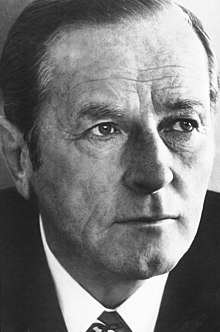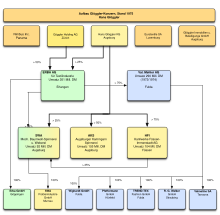Johann Nepomuk Glöggler
Johann Nepomuk Glöggler , called Hans Glöggler (born April 9, 1910 in Kaufbeuren ; † July 26, 2004 in Füssen ) was a German entrepreneur.
Life
Glöggler was born as the eighth child of Maria and Robert Glöggler in Kaufbeuren in Ostallgäu. The father was a lithographic master by profession and later a temporary city councilor and mayor of Kaufbeuren. Johann Nepomuk Glöggler was married three times and had eight children and one adopted child.
At the age of 14 Glöggler was sent to an apprenticeship in Pflach in Tyrol . There he met his later mentor and sponsor Paul Schwarzkopf , for whom he worked as general secretary. As early as the 1930s, Glöggler was able to earn a considerable fortune selling technical oils and fats and investing it in real estate. During the Second World War he served as a private on the Western Front.
In 1945 Glöggler founded a construction company and a building materials wholesaler in Augsburg , through which numerous construction projects were realized. From the late 1960s onwards, Glöggler bought up troubled textile companies with the help of loans, and in this way built up the largest German textile group in just four years by the end of the 1960s. These included traditional textile industry companies such as AKS Augsburger Kammgarn-Spinnerei and Mechanical Cotton Spinning and Weaving Augsburg - SWA. In 1973 a stake of approx. 30% in the construction company Philipp Holzmann AG followed .
The media described Glöggler's rise as "one of the most bizarre entrepreneurial careers of the post-war period". Glöggler, who was portrayed in the media as “King Midas”, “Hans im Glück” or “Textilzar”, owned a large number of companies with a total of over 12,000 employees and an annual turnover of around one billion D-Marks in the mid-1970s. The consequences of the 1973 oil crisis and structural changes in the textile industry also left their mark on the Glöggler Group. The group also struggled with liquidity bottlenecks and high credit levels. Glöggler's efforts to obtain a government guarantee for the ailing group failed. In mid-January 1976, Glöggler gave up due to a large demonstration in Füssen and agreed to a renovation by the Bavarian Ministry of Economic Affairs . The Glöggler Group broke up that same year.
Glöggler fled to Québec , Canada to avoid possible arrest. A little later he moved to Brittany , from where he brought one of the largest claims for damages against the Free State of Bavaria . After five years of trial, the Munich administrative court dismissed the lawsuit and a. back due to statute of limitations.
The later board spokesman Helmut Böck of the Füssener Textil AG, which emerged from the Hanfwerke Füssen-Immenstadt , remembers Hans Glöggler as a "passionate entrepreneur" and the "very social attitude" towards the employees.
Others
The skyscraper built by Glöggler at Alten Postweg 101 in Augsburg's university district is colloquially known in Augsburg as the Glöggler skyscraper.
Awards
- 2002: Admission to the Hockey Hall of Fame Germany for his services to ice hockey .
Works
- The escape . Pegasus-Verlag, Füssen 1994, ISBN 3-929371-01-4 .
Web links
Individual evidence
- ↑ DER SPIEGEL 32/2004. Retrieved August 7, 2013 .
- ^ Das Allgäu Online 2004. Retrieved on May 29, 2019 .
- ↑ eishockeypedia.de: Hans Glöggler
| personal data | |
|---|---|
| SURNAME | Glöggler, Johann Nepomuk |
| ALTERNATIVE NAMES | Glöggler, Hans |
| BRIEF DESCRIPTION | German entrepreneur and industrialist |
| DATE OF BIRTH | April 9, 1910 |
| PLACE OF BIRTH | Kaufbeuren |
| DATE OF DEATH | July 26, 2004 |
| Place of death | Feet |

